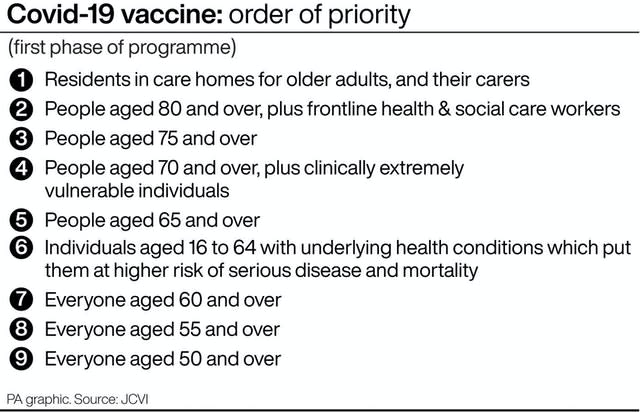Welsh care home residents unlikely to get Covid-19 vaccine
Vaccinating elderly residents against Covid-19 in more than 1,000 care home across Wales presents challenges that are difficult to overcome, the health and social care minister has said.
Vaughan Gething said problems with the transportation and storage of the Pfizer vaccine, as it needs to be kept below -70C, meant it would be difficult to vaccinate vulnerable care home residents.
He said that when the Oxford vaccine was approved for use, it would be a better option as it could be more easily stored.
Mr Gething told the Senedd: “Because of the particular characteristics of the Pfizer vaccine, we don’t think we’re going to be able to safely take it to care homes.

“That means we’re going to have a smaller number of vaccination centres that we’ll need to bring people to.
“Some care home residents therefore won’t be within the first few weeks of delivery of that vaccine.
“That is a challenge and that means that care home residents, who are right at the top of the vulnerability list, we’re not going to be able to deliver the vaccine to them.
“They will get some protection though from us in our ability to prioritise staff who work in those environments, as well as our front-line healthcare staff.
“I’m still optimistic that this vaccine will make a real difference. The Oxford vaccine gives us a much greater ability to take it out because that is a vaccine you can, essentially, store in a fridge, so with significantly fewer logistical challenges to deliver.”

Wales’s chief medical officer Dr Frank Atherton said the Welsh Government was “currently exploring ways” to get the Pfizer vaccine to care home residents, but there were “particular challenges” to overcome.
He said there was a clear list of priorities within the Joint Committee on Vaccination and Immunisation (JCVI) guidance and all four nations “are intending to follow that priority list and work down it”.
“However, that has to take into account operational concerns. I think it would be scandalous to waste the vaccine and not to use it wisely,” Dr Atherton said.
People in Wales will be sent automatic appointments detailing the location where they will receive the vaccination and the public are urged to wait to be invited instead of asking their pharmacist or doctor.
The vaccine will not be mandatory and people would be able to choose whether they take it or not, with information provided before vaccination.
Those receiving the vaccine will be given a credit card-sized NHS Wales immunisation card which will have the vaccine name, date of immunisation and batch number of each of the doses given written on them.
These will act as a reminder for the second dose and for the type of vaccine, as well as giving information on how to report side effects.
Dr Gill Richardson, co-chair of the Covid-19 Vaccine Programme Board, said people living in Wales would be “brought to the vaccine” in the first week of immunisation roll-out.
“We will be prioritising those that we can safely deliver an effective vaccine to,” Dr Richardson told the press conference.
“And then as we learn more about the vaccine – and we are all learning at a UK level – it’s very much hoped that a mobile model can be developed so that we can safely deploy to care homes without putting care home residents at risk of bringing them to a centre unnecessarily.”

 Yahoo Finance
Yahoo Finance 